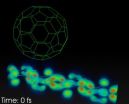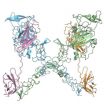(Press-News.org) CHICAGO, IL (May 30, 2014)—Fox Chase Cancer Center researchers have carried out the first retrospective analysis of adjuvant chemotherapy's impact on overall survival in patients with stage III soft tissue sarcomas (STS), adjusted for socioeconomic status and other variables. The findings show that regardless of socioeconomic status and comorbidities, adjuvant chemotherapy improved survival by approximately 23 percent in stage III STS. Study leader Sujana Movva, MD, Medical Oncologist at Fox Chase, will present the findings the 50th Annual Meeting of the American Society of Clinical Oncology.
Previous meta-analyses have demonstrated that adjuvant chemotherapy confers a small absolute survival benefit to patients with STS, which arises in the tissues that support other parts of the body. Muscle, fat, blood vessels, nerves, tendons and the tissue surrounding joints are all soft tissues in which sarcomas can arise.
STS is uncommon but can be aggressive. About 12,000 people are diagnosed with STS in the United States every year, according to the National Cancer Institute, and stage III disease has a five-year survival rate of only 50 percent. Dr. Movva noted that medical oncologists across the United States treat these patients differently.
"We really wanted to show that for these aggressive sarcomas, which have a high likelihood of becoming metastatic disease, there's a high degree of variability for who gets adjuvant chemotherapy," she said.
Dr. Movva and her colleagues analyzed medical records of 12,198 individuals diagnosed with stage III STS between 1998 and 2010 from the National Cancer Data Base (NCDB), a collaboration between the Commission on Cancer of the American College of Surgeons and the American Cancer Society. They excluded patients who had not undergone surgery for primary tumor resection and those who had tumor histologies conventionally considered to be resistant to o chemotherapy.
The NCDB, established in 1989, consolidates outcomes data from 29 million records—representing more than three-quarters of all newly diagnosed cancer cases—from cancer centers in the United States. Dr. Movva said the size of the database allowed her and her collaborators to gather enough data for a strong analysis.
"This is a lot more patients than we usually look at in sarcoma studies," she said. "Having 12,000 patients to look at is not a number we're used to."
Despite the potential benefits of adjuvant chemotherapy, she and her team found that only 29 percent of the high risk patients they studied had received the treatment. In both univariate and multivariate analyses, the Fox Chase team identified a variety of individual factors each associated with a higher likelihood of having been treated with chemotherapy. Patients who were younger than 40, were covered by private insurance, earned a higher income, had no comorbidities, had synovial histology or had tumors measuring more than 10 centimeters were more likely to have received chemotherapy.
Dr. Movva and her team found an overall survival benefit from chemotherapy. Before they adjusted for any variables, the median overall survival for patients treated with adjuvant chemotherapy was 83.9 months, compared to 48.5 months for patients not treated. Their adjusted analysis took into account 15 total different socioeconomic and tumor factors, including race, age, comorbid conditions and insurance status. The adjusted benefit also showed a significant overall survival benefit (HR=0.77) associated with adjuvant chemotherapy.
Dr. Movva noted that a previous, meta-analysis of all STS patient data estimated the absolute benefit of chemotherapy to be only about 6-11 percent depending on chemotherapy used. —Medical oncologists who treat their patients according to that estimate—especially those not in the sarcoma research community—may think that such a low benefit doesn't justify the use of chemotherapy.
However, "among stage III patients, there are some at very high risk for metastatic disease and whoare also fit enough to benefit from chemotherapy," she said.
Dr. Movva thinks that the field is moving toward better identification of those high-risk patients most likely to respond to more aggressive treatment.
"I think the state of sarcoma research is very positive and encouraging," she said. "We have a larger understanding than we used to of how heterogeneous the disease is, and we are going to make significant strides in this disease over the next several years."
INFORMATION:
Movva's coauthors included Margaret von Mehren, Eric A. Ross and Elizabeth Handorf from Fox Chase.
Fox Chase Cancer Center, part of the Temple University Health System, is one of the leading cancer research and treatment centers in the United States. Founded in 1904 in Philadelphia as one of the nation's first cancer hospitals, Fox Chase was also among the first institutions to be designated a National Cancer Institute Comprehensive Cancer Center in 1974. Fox Chase researchers have won the highest awards in their fields, including two Nobel Prizes. Fox Chase physicians are also routinely recognized in national rankings, and the Center's nursing program has received the Magnet status for excellence four consecutive times. Today, Fox Chase conducts a broad array of nationally competitive basic, translational, and clinical research, with special programs in cancer prevention, detection, survivorship, and community outreach. For more information, visit Fox Chase's Web site at http://www.foxchase.org or call 1-888-FOX CHASE or (1-888-369-2427). END
Research shows overall survival benefit for patients with Stage III soft tissue sarcomas
2014-05-30
ELSE PRESS RELEASES FROM THIS DATE:
More patients with ovarian cancer are receiving chemotherapy before surgery
2014-05-30
CHICAGO, IL (May 30, 2014)—The use of chemotherapy before surgery to remove ovarian cancer has increased dramatically in recent decades, particularly among certain patients, according to a new analysis from Fox Chase Cancer Center that will be presented at the 50th Annual Meeting of the American Society of Clinical Oncology.
Looking back at medical records from more than 58,000 women, Fox Chase's Angela Jain, MD, Medical Oncologist and co-investigator Elizabeth Handorf, PhD, member of the Biostatistics and Bioinformatics Facility, found that only 8.94% received chemotherapy ...
Compounds in saliva and common body proteins may fend off DNA-damaging chemicals
2014-05-30
A compound in saliva, along with common proteins in blood and muscle, may protect human cells from powerful toxins in tea, coffee and liquid smoke flavoring, according to results of a new study led by investigators at the Johns Hopkins Kimmel Cancer Center.
The findings, reported online May 19 in Food and Chemical Toxicology, suggest that people naturally launch multiple defenses against plant chemicals called pyrogallol-like polyphenols or PLPs found in teas, coffees and liquid smoke flavoring. The presence of these defenses could help explain why PLPs are not crippling ...
New satellite animation shows the end of Hurricane Amanda
2014-05-30
VIDEO:
This animation of visible and infrared imagery from NOAA's GOES-West satellite shows the weakening of Hurricane Amanda from May 28 to its dissipation on May 30.
Click here for more information.
A new animation of visible and infrared imagery from NOAA's GOES-West satellite shows the weakening and dissipation of the Eastern Pacific Ocean's Hurricane Amanda. The animation that runs from from May 28 to May 30 was created at NASA/NOAA's GOES Project at NASA's Goddard Space ...
Hepatitis C reactivation doesn't worsen survival for HIV+ patients diagnosed with lymphoma
2014-05-30
CHICAGO, IL (May 30, 2014)—More than a quarter of HIV+ patients are also infected with the Hepatitis C virus (HCV), which may complicate treatment and care decisions after a cancer diagnosis. The specifics of those complications haven't been well-researched in the past. Results from a new Fox Chase Cancer Center study on this patient population may start filling in that gap.
Fox Chase Hematologist and Medical Oncologist Stefan K. Barta, MD, MS, MRCP – who led the study – analyzed data from HIV+ patients diagnosed with lymphoma, collected over 17 years, to better understand ...
Identification of central nervous system involvement for patients with AIDS-related lymphomas
2014-05-30
CHICAGO, IL (May 30, 2014)—Patients with AIDS-related lymphomas (ARL) may face an increased risk of central nervous system involvement (CNSi) compared to other lymphomas. The effect of CNSi on survival outcomes, however, hasn't been thoroughly examined until now.
In a new study led by Fox Chase Cancer Center Hematologist and Oncologist Stefan K. Barta, MD, MS, MRCP, researchers report that CNSi – identified at the time of an ARL diagnosis – does not appear to have an impact on overall survival. Dr. Barta's collaborators will present the findings at the 50th Annual Meeting ...
Moffitt Cancer Center instrumental in new clinical guidelines for cancer-related fatigue
2014-05-30
TAMPA, Fla. (May 30, 2014) – Fatigue is a debilitating problem for cancer patients undergoing treatment; however, it also poses a huge detriment after treatment and can significantly affect quality of life. Approximately 30 percent of cancer patients endure persistent fatigue for several years after treatment, according to an American Society of Clinical Oncology Expert Panel co-chaired by Paul Jacobsen, Ph.D., associate center director of Population Sciences at Moffitt Cancer Center.
ASCO created the panel to develop assessment, screening, and treatment guidelines for ...
First real time movies of the light-to-current conversion in an organic solar cell
2014-05-30
VIDEO:
Real time quantum simulation of the conversion of light into current in an organic solar cell composed of a polymer chain, and a Fullerene buckyball. The movie lasts for about...
Click here for more information.
Photovoltaic cells directly convert sun light into electricity and hence are key technological devices to meet one of the challenges that mankind has to face in this century: a sustainable and clean production of renewable energy. Organic solar cells, using polymeric ...
Research details how developing neurons sense a chemical cue
2014-05-30
Symmetry is an inherent part of development. As an embryo, an organism's brain and spinal cord, like the rest of its body, organize themselves into left and right halves as they grow. But a certain set of nerve cells do something unusual: they cross from one side to the other. New research in mice delves into the details of the molecular interactions that help guide these neurons toward this anatomical boundary.
In an embryo, a neuron's branches, or axons, have special structures on their tips that sense chemical cues telling them where to grow. The new findings, by ...
Study highlights side effects felt by BRCA mutation carriers after cancer risk-reducing procedure
2014-05-30
PHILADELPHIA — The majority of women with cancer causing BRCA1 and BRCA2 mutations experience sexual dysfunction, menopausal symptoms, cognitive and stress issues, and poor sleep following prophylactic removal of their Fallopian tubes and ovaries - a procedure known as risk-reducing salpingo-oophorectomy (RRSO) - according to results of a new study from the Abramson Cancer Center and the Perelman School of Medicine at the University of Pennsylvania. The team's findings, which reaffirm the need for a better understanding of how to manage long-term effects of the risk-reducing ...
Can narcissists be moved to show empathy?
2014-05-30
Researchers at the University of Surrey and the University of Southampton have investigated whether narcissists can elicit empathy for another person's suffering. It has been well documented that narcissists lack empathy, but why is that the case, and do they have the capacity to change that behavior? The research is published in Personality and Social Psychology Bulletin.
Characterizing narcissism
When we think of narcissism most of us can all think of a colleague, friend, or former significant other that would fit the description; "A bit full of themselves, self-centered, ...


